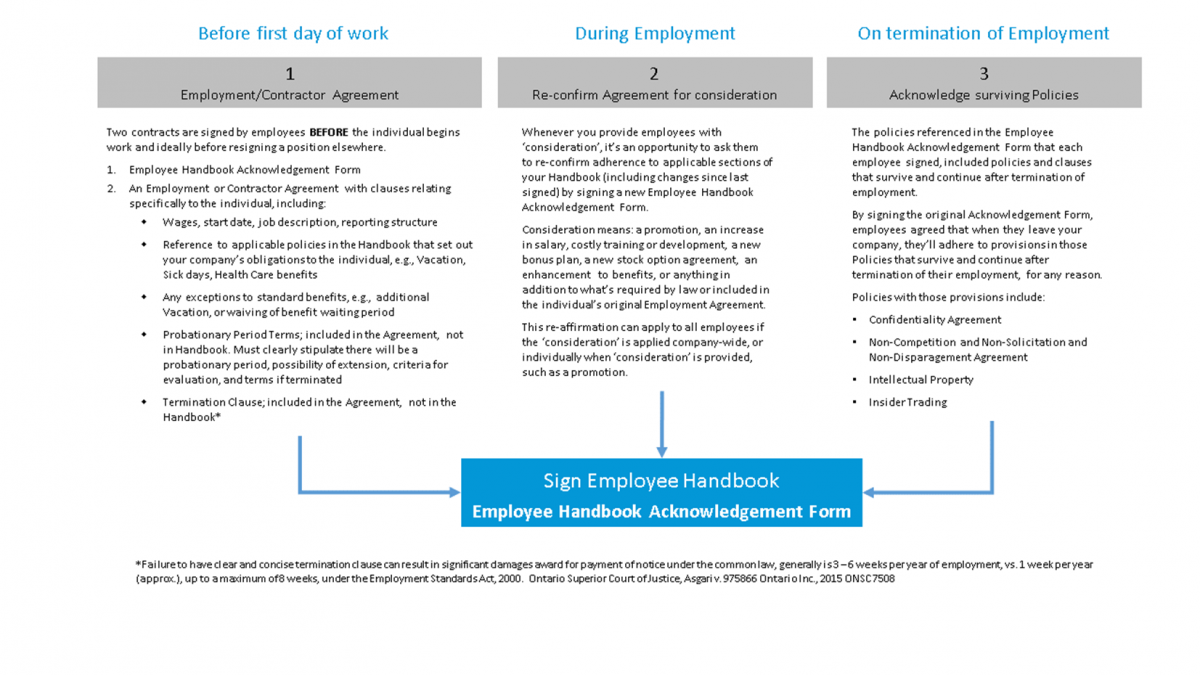“…We were constantly “reinventing” the wheel when it came to establishing even the most basic administrative policies, procedures and templates (we were constantly “borrowing” examples from our sister organizations). Your product provides us with virtually everything we were looking for in one nice, neat customizable package.”
Acknowledgement form
The ConnectsUs Employee Handbook Kit for your province includes an Employee Handbook Acknowledgement Form.

There are 5 main sections in each provincial employee handbook. ConnectsUs grouped the policies that protect your staff and company's rights into one section called 'Staff Policies'.
The Employee Handbook Acknowledgement Form is an important contract agreement signed by your Staff (employees and contractors) in the presence of a witness, acknowledging they've read, understood, and will adhere to the Staff Policies section in your Employee Handbook.
Your company and staff sign off their agreement to adhere to the policies outlined in just this one section, which acts as a binding addendum to employment contracts.
Preview it
The Employee Handbook Acknowledgement Form comes with accompanying instructions for HR staff on how to use it in different scenarios. The Acknowledgement Form is a legal contract and should be executed properly. The step-by-step Instructions Document shows your HR staff how to execute it for 4 different scenarios. .
Click an icon below to preview a portion of each document.
| Preview Employee Handbook Acknowledgement Form |
Preview Accompanying Instructions for your HR staff |
How important is it?
Having a formal agreement and process in your company to support confirmation of and adherence to Staff Policies is a critical HR fundamental.
- Why use it: The Employee Handbook Acknowledgement Form is the most important contractual agreement you have with any Staff member. It protects your company by providing evidence that an individual has read, understood and committed to adhere to all the Staff Policies in your Handbook.
- What you risk by not using it: Staff may not take your Staff Policies seriously if there's no way to prove they've seen them. A signature not only protects you in the event of litigation, but also ensures that Staff have 'skin in the game'. Non-adherence to Staff Policies can have serious consequences, including discipline or termination of employment. If an individual hasn't signed an Employee Handbook Acknowledgement Form, they can claim they didn't understand your policies or have opportunity to seek legal counsel, making it very difficult for your company to take appropriate action.
Simplified sign-off by Employees and Non-Employees
The Handbook clearly states who each policy applies to, differentiating between policies, procedures and practices applicable to employees versus non-employees. For example, your Code of Conduct policy should apply to any independent consultant who occupies a temporary seat in your workplace, not just employees. However, your overtime policy doesn't apply to an independent contractor and should be clearly marked as such.
Identifying your policies this way means everyone in your workplace can sign off on the same Handbook, simplifying the process while protecting your company.
When you use it
1. With the launch of your provincial employee handbook
- If you have existing staff, and have never had an employee handbook, you'll ask your Staff to sign the Employee Handbook Acknowledgement Form when you first launch your handbook.
- By doing so, you're essentially changing their employment contracts. We show you how to deal with that in the kit.
2. After the initial launch of your handbook
- When you extend an offer of employment, an offer for contract work, or other type of non-employment engagement. We tell you how to avoid common 'gotchas' in the Employee Handbook Kit.
- When you periodically (e.g., annually) ask staff to reaffirm their agreement with the terms and conditions outlined in the Staff Policies section of the Employee Handbook.
- When an individual leaves your company.
Click image to view larger




